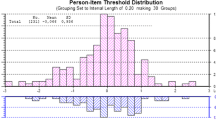Abstract
Patients with OCD are impaired in multiple domains of functioning and quality of life. While associated psychopathology complaints and neuropsychological deficits were reported, the subjective experience of general fatigue and mental fatigue was scarcely investigated. In this single-center case–control study we compared 50 non-depressed OCD outpatients consecutively recruited and 50 panic disorder (PD) outpatients, to determine whether they experienced fatigue differently. Assessment consisted of structured clinical interview for DSM-IV criteria by using the SCID-I and the SCID-II. Symptom severity was assessed using the Yale–Brown Obsessive–Compulsive Scale, the Hamilton Anxiety Rating Scale, the Hamilton Depression Rating Scale, the Clinical Global Impressions Scale, severity and the Global Assessment of Functioning Scale. Fatigue was assessed by using the Multidimensional Fatigue Inventory (MFI). Regarding MFI physical fatigue, an OR of 0.196 (95 % CI 0.080–0.478) was found, suggesting that its presence is associated with lower odds of OCD compared to PD. The same can be said for MFI mental fatigue, as an OR of 0.138 (95 % CI 0.049–0.326) was found, suggesting that its presence is associated with lower odds of OCD. Notably, OCD patients with OCDP co-morbidity reported higher scores of mental fatigue. In this study fatigue, including mental fatigue, seems not to be a prominent experience among adult non-depressed OCD patients.
Similar content being viewed by others
References
Ruscio AM, Stein DJ, Chiu WT, Kessler RC. The epidemiology of obsessive-compulsive disorder in the National Comorbidity Survey Replication. Molecular Psychiatry 15:53–63, 2010.
Deckersbach T, Dougherty DD, Rauch SL. Functional imaging of mood and anxiety disorders. Journal of Neuroimaging 16:1–10, 2006.
Jacoby RJ, Leonard RC, Riemann BC, Abramowitz JS. Predictors of quality of life and functional impairment in Obsessive-Compulsive Disorder. Comprehensive Psychiatry 55:1195–1202, 2014.
Abramovitch A, Abramowitz JS, Mittelman A. The neuropsychology of adult obsessive–compulsive disorder: A meta-analysis. Clinical Psychology Review 33:1163–1171, 2013.
Gros DF, Magruder KM, Frueh BC. Obsessive compulsive disorder in veterans in primary care: prevalence and impairment. General Hospital Psychiatry 35:71–73, 2013.
Kaiya H, Sugaya N, Iwasa R, Tochigi M. Characteristics of fatigue in panic disorder patients. Psychiatry and Clinical Neuroscience 62:234–237, 2008.
Subramaniam M, Soh P, Vaingankar JA, Picco L, Chong SA. Quality of life in obsessive-compulsive disorder: impact of the disorder and of treatment. CNS Drugs 27:367–383, 2013.
American Psychiatric Association. Diagnostic and Statistical Manual of Mental Disorders. 4th ed. Text Revision. Washington, American Psychiatric Press, 2000.
First MB, Spitzer RL, Gibbon M, Williams JBW. Structured Clinical Interview for DSM-IV Axis I Disorders (SCID I), Research Version, Patient Edition. New York, Biometric Research, New York State Psychiatric Institute, A1–A46, 2002.
First MB, Gibbon M, Spitzer RL, Williams JBW, Benjamin LS. Structured Clinical Interview for DSM-IV Axis II Personality Disorders (SCID-II). Washington, American Psychiatric Press, Inc., 1997.
Goodman WK, Price LH, Rasmussen SA, Mazure C, Fleischmann RL, Hill CL et al. The Yale–Brown Obsessive Compulsive Scale: I. Development, use, and reliability. Archives of General Psychiatry 46:1006–1011, 1989.
Goodman WK, Price LH, Rasmussen SA, Mazure C, Delgado P, Heninger GR et al. The Yale–Brown Obsessive Compulsive Scale: II. Validity. Archives of General Psychiatry 46:1012–1016, 1989.
Smets EMA, Garssen B, Bonke B, De Haes JCJM. The Multidimensional Fatigue Inventory (MFI). Psychometric qualities of an instrument to assess fatigue. Journal of Psychosomatic Research 39:315–325, 1995.
Hamilton M. The assessment of anxiety states by rating. British Journal of Medical Psychology 32:50–55, 1959.
Leentjens AFG, Dujardin K, Marsh L, Richard IH, Starkstein SE, Martinez-Martin P. Anxiety rating scales in Parkinson’s disease: a validation study of the Hamilton Anxiety Scale, the Beck Anxiety Inventory and the Hospital Anxiety and Depression Scale. Movement Disorders 26:407–415, 2011.
Hamilton M. A rating scale for depression. Journal of Neurology, Neurosurgery, and Psychiatry 23:56–62, 1960.
Guy W. ECDEU Assessment Manual of Psychopharmacology—Revised (DHEW Publ No ADM 76-338). Rockville, MD: Department of Health, Education, and Welfare, Public Health Service, Alcohol, Drug Abuse, and Mental Health Administration, NIMH Psychopharmacology Research Branch, Division of Extramural Research Programs, pp. 218–22, 1976.
Endicott J, Spitzer RL, Fleiss JL. The global assessment scale. A procedure for measuring overall severity of psychiatric disturbance. Archives of General Psychiatry 33:766–71, 1976.
Hosmer DW, Lemeshow S. Applied Logistic Regression. New York, Wiley, 1989.
R Development Core Team: R. A language and environment for statistical computing. Vienna, Austria: R Foundation for Statistical Computing; 2013.
Conflict of interest
Pasquini M, Tarsitani L, Berardelli I, Roselli V, Maraone A, Piacentino D, and Biondi M declare that they have no conflict of interest.
Author information
Authors and Affiliations
Corresponding author
Rights and permissions
About this article
Cite this article
Pasquini, M., Piacentino, D., Berardelli, I. et al. Fatigue Experiences Among OCD Outpatients. Psychiatr Q 86, 615–624 (2015). https://doi.org/10.1007/s11126-015-9357-3
Published:
Issue Date:
DOI: https://doi.org/10.1007/s11126-015-9357-3



